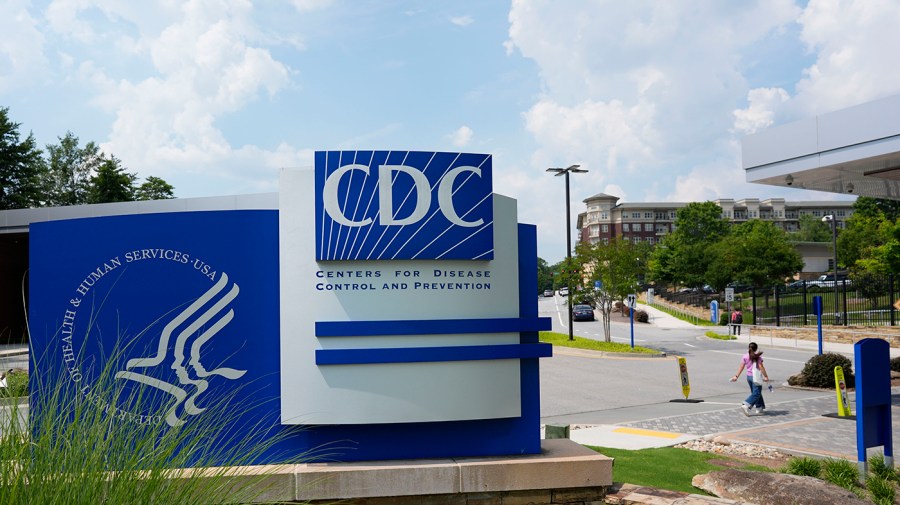The Trump administration has delayed or blocked millions of dollars in federal grants from the Centers for Disease Control and Prevention (CDC), leaving state and local health departments in the dark, uncertain when or even if they will get money that’s already been appropriated by Congress for key public health initiatives.
With little communication from the White House, CDC staff are trying to expedite getting grants out the door, and public health officials are scrambling to spend the money they have before it expires Sept. 30.
The CDC typically doles out the money it receives from Congress to state and local health departments, which in turn fund local contracts.
But with the start of the new administration, the White House began to apportion money to CDC on a month-by-month basis, citing the need for external reviews.
That practice stopped when the agency received a two-month apportionment through the end of the fiscal year, according to CDC employees, but some grants were delivered late while others are still being blocked.
“Everything is weeks, if not months behind schedule,” a CDC employee with knowledge of the funding situation said.
Another employee noted the extra layers involved in getting funding out the door, including new external reviews being conducted by the U.S. Department of Government Efficiency (DOGE).
“With every single award requiring DOGE review, there is fear the award may not be made before the end of the fiscal year and lapse of funds,” the employee said.
Raynard Washington, director of the Mecklenburg County Public Health Department in North Carolina, said his agency laid off six workers — including half its disease investigators — after grants for HIV prevention and surveillance programs expired at the end of May with no information about future funding.
The grants were eventually restored about a month later, but to date the department has only been able to bring back half of the people it laid off.
“So now we’re behind, and cases are still being reported every day that have to be investigated,” Washington said. “The more time that people may have been exposed to HIV and don’t know it, or syphilis and don’t know it and are getting tested and treated, those delays actually translate to potential illness.”
Meanwhile, the Trump administration is preventing CDC from funding tens of millions of dollars in other awards, including for public health emergency preparedness, chronic disease prevention and education, academic prevention research centers, gun violence, and tobacco use.
That means activities like training hospital staff and other health workers alongside first responders to prepare for a natural disaster are on hold.
Washington said North Carolina had to lay off its team working on tobacco prevention efforts because the funding had dried up.
“These are not delays that we expect, given that Congress has appropriated funding for these initiatives,” Washington said. “And these are things that — despite the political swings in Washington — have largely received bipartisan support, and so you don’t expect that there was going to be gaps.”
Philip Huang, director of Dallas County Health and Human Services in Texas, said he was waiting for nearly 30 percent of the promised award for public health emergency preparedness.
The state doesn’t know if that money is ever coming, Huang said.
“So, it makes it very difficult for us to plan. And many health departments don’t have much buffer. If you plan and keep everything fully operational with all your staff now, and then you don’t get the [remaining funding], then you’re not going to be able to last through the year,” Huang said.
CDC centers are currently not allowed to move funding into the blocked programs, according to employees.
If that money is not apportioned by Sept. 30, it could be returned to the Treasury, a maneuver known as a “pocket rescission” that has drawn criticism from lawmakers in both parties.
Congress in July approved the White House’s official rescissions proposal to claw back $9 billion of funding for foreign aid and public broadcasting. The White House would have to send another official rescission message to Congress, which Office of Management and Budget (OMB) Director Russell Vought claims would effectively freeze the funding and cause it lapse.
“Effectively, what they’re doing is keeping that money in house. We can’t pull it down,” said Scott Harris, chief of the Alabama Department of Public Health and president of the Association of State and Territorial Health Officials.
“We have grants that we thought we had access to, we suddenly have different rules about how we’re allowed to spend.”
Asked about the status of CDC grants, the Department of Health and Human Services referred The Hill to OMB, which did not respond to multiple requests for comment.
Harris said the uncertainty is “chaos” for health departments and makes it almost impossible to predict or plan for the future.
“We never really know month to month if a program’s still going to be here anymore,” Harris said. “We have serious concerns about whether all of the money that has been awarded will be spent before the end of the fiscal year. New instructions on which types of expenditures are allowable will prevent us from supporting much of the programmatic work that the grants are designed to fund.”

